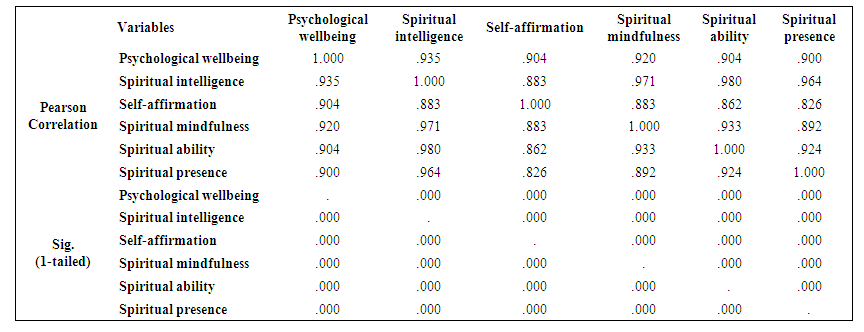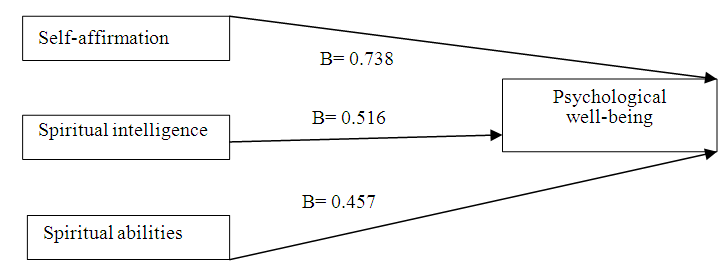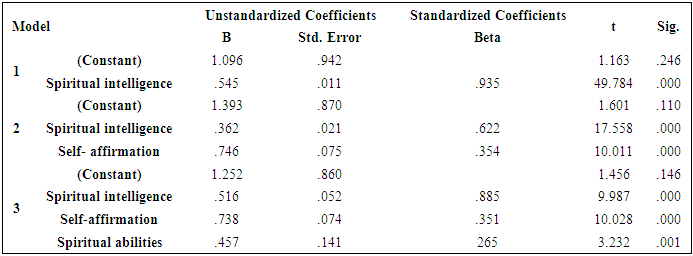-
Paper Information
- Previous Paper
- Paper Submission
-
Journal Information
- About This Journal
- Editorial Board
- Current Issue
- Archive
- Author Guidelines
- Contact Us
International Journal of Applied Psychology
p-ISSN: 2168-5010 e-ISSN: 2168-5029
2019; 9(4): 104-109
doi:10.5923/j.ijap.20190904.02

Spiritual Intelligence and Self-Affirmation as Predictors of Athletes' Psychological Well-Being
Boshra A. Arnout1, Ahed J. Alkhatib2, Dina E. Abdel Rahman3, Slavica Pavlovic4, Zeyad S. Al-Dabbagh5, Oleg Y. Latyshev6
1Department of Psychology, King Khalid University, Zagazig University, Egypt
2Department of Legal Medicine, Toxicology of Forensic Science and Toxicology, School of Medicine, Jordan University of Science and Technology, Jordan, International Mariinskaya Academy, Department of Philosophy, Academician Secretary of Department of Sociology
3Department of Psychology, Port said University, Egypt
4Faculty of Science and Education, University of Mostar
5University of Mosul, College of Political Science, Iraq
6Academician of the, Russian Academy of Natural History, President of International Mariinskaya Academy
Correspondence to: Boshra A. Arnout, Department of Psychology, King Khalid University, Zagazig University, Egypt.
| Email: |  |
Copyright © 2019 The Author(s). Published by Scientific & Academic Publishing.
This work is licensed under the Creative Commons Attribution International License (CC BY).
http://creativecommons.org/licenses/by/4.0/

The purpose of the present study was to examine the Possibility of Spiritual intelligence and self-affirmation as predictors of psychological well-being among sports athletic. The sample consisted of 360 Students of the Faculty of Physical Education at Zagazig University (males= 193, females= 167), Their ages ranged between 18 to 23 years. Materials used for this study included spiritual intelligence scale, the self-affirmation scale, and the psychological well-being scale. The collected data were analyzed by stepwise regression. The results showed a statistically significant predictability of self-affirmation, spiritual intelligence and spiritual abilities to psychological well-being among athletes. It seems that the higher self-affirmation, spiritual intelligence and spiritual abilities, the higher psychological well-being.
Keywords: Spiritual Intelligence, Self-affirmation, Psychological well-being, Athletes
Cite this paper: Boshra A. Arnout, Ahed J. Alkhatib, Dina E. Abdel Rahman, Slavica Pavlovic, Zeyad S. Al-Dabbagh, Oleg Y. Latyshev, Spiritual Intelligence and Self-Affirmation as Predictors of Athletes' Psychological Well-Being, International Journal of Applied Psychology, Vol. 9 No. 4, 2019, pp. 104-109. doi: 10.5923/j.ijap.20190904.02.
Article Outline
1. Introduction and Literature Review
- The concepts of spiritual intelligence, Self-affirmation, psychological well-being are one of a constructs of positive psychology. Arnout (2019) argued that Positive psychology focuses on the characteristics of normal human behavior, happiness by enhancing his abilities such as well-being, spiritual intelligence, gratitude, mindfulness, psychological resilience, positive thinking, tolerance, hope, etc., so that the individual can effectively cope with the stress of life. Positive psychology also interested in studying psychological processes that contribute to increasing the individual's satisfaction, physical and psychological health, development of virtues and sense of responsibility (p. 5). Spiritual intelligence is the necessity of adjustment of the life, and people with higher spiritual intelligence have higher forgiveness against any stressful situations (Smith, 2004). Amram and Dryer (2008) argued that Spiritual intelligence combines the constructs of spirituality and intelligence into a new construct. Amram (2009) considered spiritual intelligence is focused on the rituals and beliefs with regard to the sacred within institutional organizations. But Wigglesworth (2012) was defined spiritual intelligence as a specific set of beliefs and practices, usually based on a sacred text, and represented by a community of people. Whoever Emmons (1999) defines spiritual intelligence as “a framework for identifying and organizing skills, and abilities needed for the adaptive use of spirituality” (p. 163).There are four meanings of the spiritual intelligence offer by Wilber (2007): the first mean is the highest levels in any of the developmental lines, the second is spiritual intelligence is mean a separate line of development, but the third moon is an extraordinary peak experience or “state” experience which could be enacted by mediation or prayer, and the forth mean of spiritual intelligence is a special attitude that can be present at any stage or state such as love, compassion or wisdom. Arnout (2016a) argued three dimensions of spiritual intelligence: spiritual mindfulness, spiritual abilities, and spiritual presence. The previous studies have shown that spiritual intelligence was related to personality traits (Arnout, 2007). Spiritual intelligence is very important for individual quality of life (Arnout, 2008), and it is vital to Human hemostasis (Arnout and Ahed, 2019), As well as related to ethics for Scientific researchers (Arnout etal, 2019), and for psychological safety among adolescents. Steele (1988) argued that self- affirmation is one of coping strategies, which focusing on personal values and strengths. Thus Creswell, Welch, Taylor, Sherman, Grunewald and Mann (2005) said that the self-affirmation dampened stress activity. And increased psychological well-being (Nelson, Fuller, Cho and Lyubomirsky, 2014). people are motivated to maintain a view of the self that is “adaptively and morally adequate, competent, good, coherent, unitary, stable, capable of free choice, and capable of controlling important outcomes (Steele, 1988, p. 262).Self-affirmation is the ability of the person to express verbally and behaviorally his or her "feelings and thoughts" about his feelings, thoughts, opinions and attitudes towards people and events and to claim his rights without injustice or aggression. The athletes self-affirmation is the skill that enables athletes to maintain a good image of themselves, and also enables them to preserve their rights and fulfill their desires without exceeding the needs and rights of others.Self-affirmation is one of the most important psychological skills, an athlete should possess and practice it, for the following reasons:• Self-affirmation generates a sense of psychological comfort.• Prevents accumulation of negative emotions.• Through self-affirmation, a person maintains his rights, interests and achieves his goals.• Self-affirmation strengthens self-confidence.• Self-affirmation gives a start in the fields of life "thought and behavior" after the elimination of negative emotions suppressed.• An individual can face psychological stress Psychological well-being, defined as the combination of one's self-esteem, mastery, trait-anxiety, and mood (Campbell, 1995). it is also a good or satisfactory condition of existence, a state of health, happiness, and prosperity (Carl, 2015). Psychological well-being refers to what an individual needs for mental, social, and cognitive health (Ryff, 1989). The researchers posit two types of well-being—hedonic and eudaimonic. Hedonic well-being encompasses the experience of frequent positive emotions and infrequent negative ones (i.e., affect balance), whereas eudaimonic well-being represents living life in accordance with a “true self,” including the fulfillment of psychological needs, the experience of meaning and purpose in life, and engage in flow experiences (Emanuel, Howell, Taber, Ferrer, Klein and Harris, 2016, p. 5). The individual who characterized by psychological well-being has a high level of psychosocial adjustment and behavior (Reber and Rober, 2001). Riff and Keyes (1995) viewed Six main dimensions of psychological well-being: The person’s self-acceptance, positive relations to others, autonomy, environmental mastery, purpose in life, and personal growth.There are an increasing number of studies of spiritual intelligence in relation to psychological variables. Moallemi, Bakhshani and Raghibi (2011) study showed that spiritual intelligence improved individual physical and emotional health. As for the relationship between spiritual intelligence and psychological well-being Tasharrofi, Hatami and Asgharnejad (2013) study found a statistical and significant relationship between spiritual intelligence and spiritual well-being among nurses. Likewise Sahebalzamani, Farahani, Abasi and Talebi (2013) study showed a significant relationship between spiritual intelligence and psychological well-being and having a purpose in life among nurses. Abadi (2014) study finding showed that there was a positive and significant relation between spiritual intelligence and sport behavior. The results of Katagami and Tsuchiya (2016) indicated that received support was positively correlated with athletes' psychological support. As well the study of Mirzaaghazadeh, Farzan and Amirnejad (2015) found a statistical and significant correlation between spiritual intelligence and life satisfaction of national team athletes. The results founded on the study on Micoogullari, Odek and Beyaz (2017) revealed that there was a significant relationship between sport mental toughness and psychological wellbeing in undergraduate student athletes. The results of Wojujutari, Alabi, Emmanuel and Olugbenga (2018) showed that spiritual intelligence significantly moderate relationship between psychological well-being and psychosocial adjustment of pregnant women. Cornil and Chandon (2013) study finding referred that for sports fans who spontaneously self-affirmed after their favored team lost, consumed fewer calories than those who did not, this result confirm the important role of self-affirmation to athletes. The results of Emanuel etal., (2016) study showed that self-affirmation is associated with psychological well-being.Because athletes are high achievers and goal-oriented, thus their psychological well-being is very important to reveal the factors that predict it. Therefore, the purpose of the present study is to examine the impossibility of spiritual intelligence and self-affirmation as predictors for the athlete's psychological well-being. To our knowledge, no study has yet studied that.
2. Objectives of the Study
- The main objective of the study was to examine the Possibility of spiritual intelligence and Self-affirmation as predictors of psychological well-being among sports athletes.
3. Method
3.1. Research Design
- A descriptive design was used to examine the predictability of spiritual intelligence and Self-affirmation to athletes' psychological well-being.
3.2. Participants
- The study sample was randomized, it consisted of three hundred and sixty Students of the Faculty of Physical Education at Zagazig University (males= 193, females= 167), 174 who played either individual sports (Judo, track and field, swimming, gymnastics), and 186 team sports (football, basketball, baseball). Their ages ranged between 18 to 23 years.
3.3. Instruments
- Spiritual intelligence scale (SIS): The spiritual intelligence scale was developed by Arnout (2016b) to assess spiritual intelligence. this scale comprises of 27-items self-report measure that assesses three main domains of spiritual intelligence: SIS rates individual response on 5-point Likert scale 1=“ Disagree completely” and 5 =“ I total agree” with higher scores indicates more spiritual intelligence. These three (3) dimensions include: spiritual mindfulness, spiritual abilities, and spiritual presence. Internal consistency values of SIS were significantly higher; reliability co-efficient of sub-scales ranged between (0.941, 0.962), and Cronbach’s α was (0.982).Self-affirmation scale (SAS-10): The Self-affirmation Self Report scale (SAS) comprised 10-items, developed by researchers in this study, to assess individual's self-affirmation. SAS 10-items are rated on a 3-point Likert scale from 1=not at all true to me to 3=completely true to me. SAS total scores range from 1 to 30 and higher scores indicate high self-affirmation. The SAS has good internal consistency, the correlation coefficients between items and the total scale was ranged between (. 62 to 0.78), and the Cronbach’s alpha co-efficient of the scale was 0.931.Scales of psychological well-being (SPWB- 20):Scales of Psychological Well-Being (SPWB) is a self-report instrument developed by researchers in this study. SPWB consists of 20 items, which respondents are rated on a 3-point Likert scale. The SPWB has good internal consistency alpha coefficient of 0.971.
3.4. Procedures
- Ethical was obtained from the research committee of the participants. The questionnaires were administered individually to the respondents by the researchers on their Facebook, twitter, Instagram accounts. All respondents were being instructed to fill the questionnaire privately and to submit to the researchers the same day. This is to guarantee the respondents confidentiality and privacy.
3.5. Data Analysis
- Data collected were analyzed using linear stepwise regression. All analyses were carried out with the program of the statistics package for social sciences (SPSS version 26).
4. Results
- The results of the linear stepwise regression analysis presented in Tables 4 and 5 showed that Self-affirmation, spiritual intelligence and spiritual abilities are significantly can be considered as predictors of athletes' psychological well-being with total variance of 90.4% (R2 = 0.904, p> 0.001). These results indicate that Self-affirmation, spiritual intelligence and spiritual abilities are significantly predicted of athlete psychological well-being.
|
|
 | Table 3. Correlations |
|
|
 | Figure 1. Predicting psychological well-being from self-affirmation, spiritual intelligence and spiritual abilities |
5. Discussion
- The study examined the possibility of spiritual intelligence and Self-affirmation significantly as predictors of athletes' psychological well-being. The result of the study supported the previous studies that showed the spiritual intelligence correlated to psychological well-being. Their result implies that as the athletes' spiritual intelligence and self-affirmation increase so as the well-being increases with it. The results of the finding concur with the study by (Moallemi, Bakhshani and Raghibi, 2011; Tasharrofi, Hatami and Asgharnejad, 2013; Sahebalzamani etal., 2013; Wojujutari etal., 2018). Athletes' spiritual intelligence makes their life meaningful, and also makes their relationships to others based on faith, and thus the athletes have a positive attitude toward themselves, colleges and the all humanity.The results of this study also confirmed by the study of Emanuel etal., (2016) who concluded that self-affirmation are associated with psychological well-being. So that is, an increase in spiritual intelligence and self-affirmation growth can act as a basis for a better and more psychological well-being of athletes. The results of the study are also congruent with the previous study of Abadi (2014) who found out that spiritual intelligence related to sport behavior. The study results are in line with the previous study of Mirzaaghazadeh, Farzan and Amirnejad (2015) whose findings ascertained that spiritual intelligence was associated with life satisfaction of national team athletes. Sherman & Cohen (2006) mentioned that self-affirming promotes a positive self-image because it provides a means by which individuals can secure a sense of being competent, good, and self-determining in the coping life stress. Thus Emanuel etal (2016) described self-affirmation as part of the psychological immune system. Creswell, Welch, Taylor, Sherman, Gruenewald, and Mann (2005) said that we can keep neuroendocrine and psychological responses to stress at low levels if we increased the self-affirmation.These results confirm the importance of the athletes spiritual intelligence and self-affirmation development to increase their psychological well-being, Directs athletes to take the necessary efforts to achieve their objectives. whereby, we must raise the psychological and moral spirit of the athlete by providing logistical, material and psychological support to him and notify him that an important element is indispensable for his existence and skills, as well as the need to provide all means through which work is done to develop his skills and refine His talent.
6. Conclusions and Recommendations
- It was concluded in the study that spiritual intelligence and self-affirmation predict athletes psychological well-being. The overall implication of this study is that the spiritual intelligence and self-affirmation of the athletes are very important and requires policy directions and initiatives aimed to increase their overall well-being. Therefore, athletes' spiritual intelligence and self-affirmation should be enhanced and they should be engaging practice in order to improve their psychological well-being.
 Abstract
Abstract Reference
Reference Full-Text PDF
Full-Text PDF Full-text HTML
Full-text HTML


